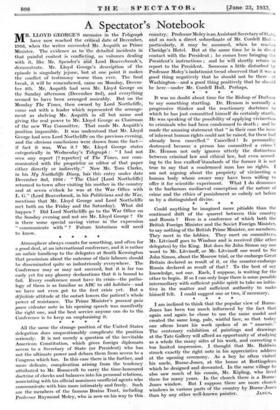A Spectator 's Notebook
MR. LLOYD GEORGE'S memoirs in the Teligraph have now reached' the critical date of December, 1916, when the writer succeeded Mr. Asquith as Prime Minister. The evidence as to the detailed incidents in that painful contest is conflicting, as volumes dealing with it, like Mr. Spender's and Lord Beaverbrook's, demonstrate. Mr. Lloyd George's description of the episode is singularly jejune, but at one point it makes the conflict of testimony worse than ever. The final break, it will be remembered, came on Monday, Decem- ber 4th.' Mr. Asquith had seen Mr: Lloyd George on the Sunday afternoon (December 3rd), and everything seemed to have been arranged amicably. But on the Monday The Times, then owned by Lord Northcliffe; came out with a leader which represented the arrange= ment as shelving Mr. Asquith in all but name and giving the real power to Mr. Lloyd George as Chairman, of the new War Committee. That made' Mr. Asquith's position impossible. It was understood that Mr. Lloyd George had seen Lord Northcliffe on the previous evening, and the obvious conclusions were drawn from the fact-' if fact it was. Was it ? Mr. Lloyd George states categorically in Wednesday's Telegraph : " I had not seen any report [? reporter] of Thi Times, nor com- municated with the propriefOr or editor of that paper either directly or indirectly." Now Mr. Tom Clarke, in his My Northcliffe Diary, has this entry under date December 3rd, 1916: " The Chief [LOrd Northcliffe] returned to town after visiting his. mother in the country and at seven o'clock he was at the War Office with L. G." (Lord Beaverbrook, in his Politicians and the War,' mentions that Mr. Lloyd George and Lord Northcliffe met both on the Friday and the Saturday). What did happen ? Did Lord Northcliffe go to the War Office on the Sunday evening and not see Mr. Lloyd George ? Or is there 'some special saving virtue in ' the expression " communicate with " ? Future historians will need to know.
* • * *








































 Previous page
Previous page